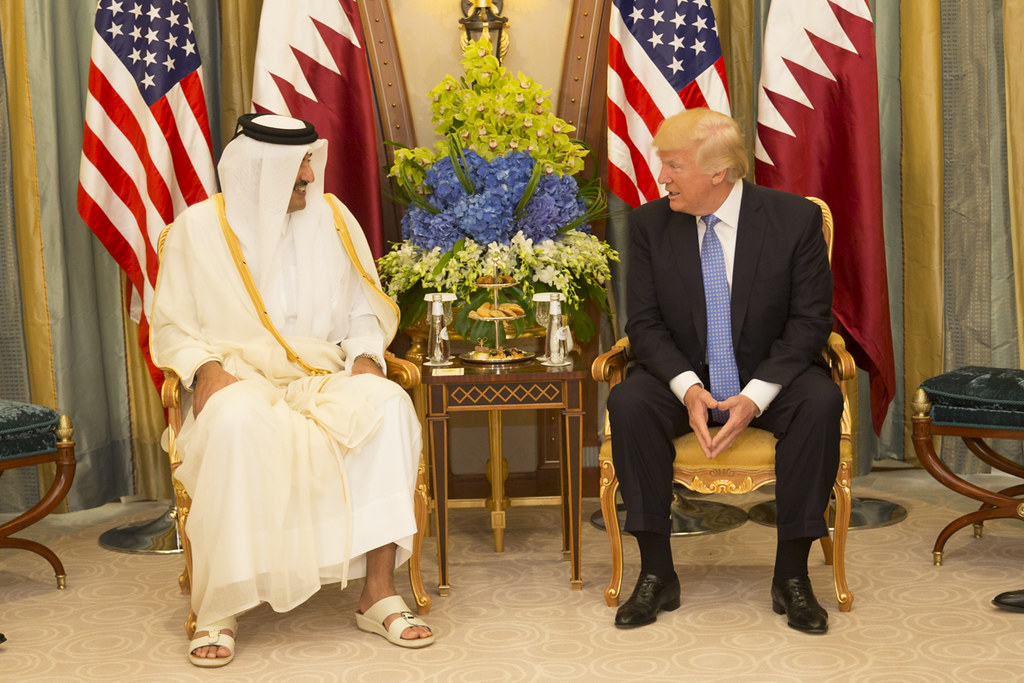President Trump’s Visit to the Gulf States and Its Strategic Implications
So Yeon Ahn (SNUAC)
U.S. President Donald Trump undertook his first overseas trip of his second term with visits to Saudi Arabia, the United Arab Emirates (UAE), and Qatar. As in his first term, the decision to begin his foreign travel in the Gulf underscores the strategic importance these states hold in Trump’s foreign policy calculus. The visit offered a clear illustration of President Trump’s transactional approach to diplomacy, characterized by large-scale economic and defense agreements.
In Saudi Arabia, President Trump secured investment commitments totaling approximately $600 billion, encompassing sectors such as artificial intelligence and arms procurement. The visit to Qatar resulted in a contract for the purchase of 210 Boeing aircraft. In a symbolic gesture of goodwill, the Qatari government also presented President Trump with a Boeing 747-8 aircraft, drawing considerable public and media attention.
During the final leg of the tour in the UAE, Trump reached an agreement for an additional $200 billion investment. A key component of this agreement was the establishment of a major artificial intelligence campus in Abu Dhabi, including the construction of a 5-gigawatt-capacity AI data center.
While the Trump administration claimed that the total value of the agreements reached during the tour amounted to $2 trillion, some analysts have cast doubt on this figure, estimating the actual scale to be closer to $700 billion. Nevertheless, the visit effectively highlighted the core tenets of Trump’s diplomacy, which privileges tangible economic gains and strategic deals over traditional diplomatic formalities.
Notably, the visit also included a trilateral meeting in Riyadh with Saudi Crown Prince Mohammed bin Salman and Syrian President Ahmad Shara, during which President Trump announced the lifting of U.S. sanctions on Syria—an unexpected move signaling a potential shift in Washington’s policy toward Damascus. The omission of Israel from the itinerary has further prompted speculation and debate over the evolving dynamics of the U.S.–Israel relationship under Trump’s second-term administration.
트럼프 대통령의 걸프 3개국 방문과 함의
안소연 (아시아연구소)
미국 도널드 트럼프 대통령은 취임 이후 첫 해외 순방지로 사우디아라비아, 아랍에미리트, 카타르 3개국을 방문하였다. 트럼프 1기와 마찬가지로 2기에도 걸프 지역을 첫 순방지로 선택한 것은 트럼프 대통령에게 걸프 국가들이 지니는 중요성을 보여주는 것이라 할 수 있다. 이번 방문 기간 동안 트럼프 대통령은 거래식 외교의 행보를 명확하게 보여주였다. 먼저 사우디아라비아를 방문한 트럼프는 이번 방문을 통해 사우디로부터 인공지능 및 무기 거래 계약을 포함하여 6천억 달러의 투자를 약속받았다. 이후 카타르를 방문하여 트럼프 대통령은 보잉사로부터 210대의 항공기를 구매하기로 하는 계약을 카타르로부터 얻어낼 수 있었다. 또한, 이번 방문을 계기로 트럼프 대통령은 카타르로부터 보잉 747-8 항공기를 선물로 받으면서 극진한 대접을 받아 화제가 되기도 하였다. 마지막 순방지로 UAE를 방문하여 UAE로부터 2천억 달러에 달하는 투자를 성사시켰다. 특히, UAE 아부다비에 5기가 와트 용량에 달하는 AI 데이터 센터를 유치한 대규모 AI 캠퍼스를 건립하는데 합의하였다.
한편, 트럼프 행정부는 이번 걸프 방문으로 2조 달러 가치에 달하는 거래를 성사시켰다고 주장하였지만 일각에서는 실제 규모는 7천억 달러에 달하는 것이라는 비판도 함께 제기되고 있다. 이번 걸프 방문은 거래식 외교의 면모를 중시하는 트럼프 외교 전략을 효과적으로 드러낼 수 있었던 방문이었다고 평가할 수 있다. 이밖에도 이번 중동 순방에서 트럼프 대통령은 사우디 무함마드 빈살만 왕세자와 함께 리야드에서 시리아 대통령 아흐마드 샤라 대통령과 만남을 가졌으며 시리아에 대한 미국의 제재를 중단할 것이라고 전격 발표하기도 하였다. 또한, 이번 중동 순방 중 이스라엘을 방문하지 않았다는 점에서 이스라엘과 트럼프 정부와의 관계에 대한 다양한 분석이 잇따르고 있다.

